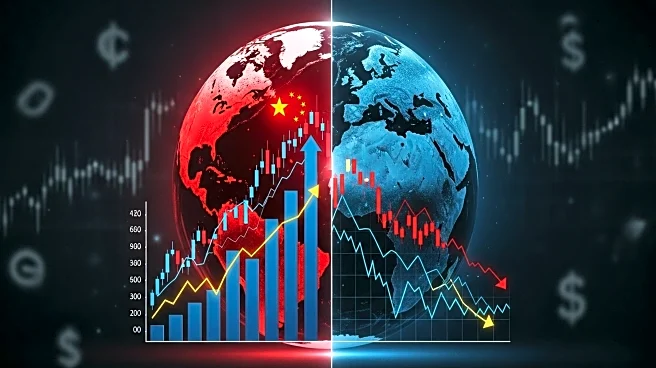What's Happening?
China's stock market, which had been experiencing a significant rebound, is now facing challenges due to renewed trade tensions with the United States. The CSI 300 index, tracking major stocks in Shanghai and Shenzhen, had rallied nearly 20% since the beginning of the year, while the Hang Seng Index surged around 33%. This growth was largely driven by expectations of government stimulus and increased foreign capital inflow. However, recent warnings from Washington regarding Beijing's rare earth export controls have reignited fears of a trade conflict, causing both indexes to lose over 2% on Monday. Analysts are concerned that the market's optimism may unravel if geopolitical risks continue to escalate.
Why It's Important?
The renewed trade tensions between the U.S. and China could have significant implications for global economic stability. If the conflict intensifies, it may lead to a deep recession or even a depression, affecting both economies and potentially dragging down global markets. The situation is particularly precarious as markets had priced in a potential détente ahead of a possible meeting between President Trump and President Xi Jinping. The unexpected resurgence of tariff rhetoric has caught investors off guard, leading to concerns about the future performance of global equities, which had been aggressively positioned for growth.
What's Next?
The potential for a meeting between President Trump and President Xi Jinping now seems unlikely, according to analysts. If neither side makes concessions, the trade tensions could escalate further, impacting not only the U.S. and Chinese economies but also the broader global market. Investors may need to brace for a period of market volatility, with equities possibly trading sideways or experiencing further pullbacks. The situation remains fluid, and stakeholders will be closely monitoring any developments or statements from both governments.
Beyond the Headlines
The trade tensions highlight the fragile nature of international economic relations and the potential for geopolitical conflicts to disrupt market stability. The reliance on rare earth materials and the strategic importance of these resources underscore the complexities of global trade dynamics. As countries navigate these challenges, there may be increased focus on diversifying supply chains and reducing dependency on single sources for critical materials.









